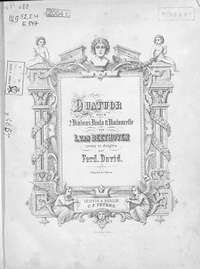
Полная версия
Beethoven, the Man and the Artist, as Revealed in His Own Words


Titel: Beethoven, the Man and the Artist, as Revealed in His Own Words
von Augustus J. Thebaud, Charles Kingsley, Henry James, Thomas Hardy, Kate Douglas Smith Wiggin, Joseph Butler, John D. Barry, William Allan Neilson, Henry Rider Haggard, Rudolf Erich Raspe, Paul Heyse, Carl Russell Fish, Tom Taylor, Margaret Pedler, Homer, John Kendrick Bangs, John Burroughs, Juanita Helm Floyd, Maurice Liber, Anthony Trollope, William Morris, Mark Twain, Charles Dudley Warner, Thomas Hobbes, Winfried Honig, Albrecht Dürer, Militia of Mercy . Gift Book Committee, Ella Wheeler Wilcox, Andrew Lang, Katharine Pyle, Sir Samuel White Baker, Frederic William Moorman, the Younger Pliny, Samuel Butler, William Dean Howells, Harold MacGrath, Joseph Crosby Lincoln, Ralph Connor, Various, Oliver Wendell Holmes, Abraham Lincoln, John Galsworthy, Ian Maclaren, Charlotte Mary Yonge, Sir Owen Morgan Edwards, Robert J. C. Stead, Harold Bell Wright, Eleanor H. Porter, Richard Le Gallienne, Ann Ward Radcliffe, Mark Rutherford, John Bunyan, Artemus Ward, John Hanning Speke, James Fenimore Cooper, Edmund Burke, Sir Arthur Conan Doyle, Francis Bacon, Gisela Engel, Edward Samuel Corwin, Washington Irving, Rafael Sabatini, Emma Lazarus, Bishop of Hippo Saint Augustine, Christian Friedrich Hebbel, Adam Smith, Upton Sinclair, Michael Earls, John Hargrave, Charles Hose, William McDougall, Albert Ernest Jenks, marquis de Jean-François-Albert du Pouget Nadaillac, Robert Sewell, 16th cent. Fernão Nunes, 16th cent. Domingos Paes, Inez Haynes Gillmore, Charles Warren Stoddard, Will Irwin, Vivia Hemphill, J. Hampton Moore, Philip Gibbs, Sir Richard Steele, Joseph Addison, L. Mühlbach, Leroy Scott, Mrs. Henry Wood, Ottilie A. Liljencrantz, Algernon Charles Swinburne, Thomas Bulfinch, Bernard Shaw, Confucius, Samuel Pepys, Luís Vaz de Camões, Walter Bigges, Theodore Roosevelt, Émile Gaboriau, fl. 1580. Edward Hayes, Eugène Sue, Earl of Philip Dormer Stanhope Chesterfield, Robert Smythe Hichens, Bliss Perry, Isabella L. Bird, Stewart Edward White, Roald Amundsen, Viscount James Bryce Bryce, Francis Hopkinson Smith, Annie Hamilton Donnell, Mary Wollstonecraft, Jean-Henri Fabre, Marcus Andrew Hislop Clarke, Marietta Holley, W. E. Gladstone, Ellis Parker Butler, Booth Tarkington, G. A. Henty, E. L. Voynich, Anonymous, Francis Leggett, Charles Alfred Tyrrell, Josef Cohen, Jules Verne, Zane Grey, Mary Baker Eddy, Albert Bigelow Paine, Mary Roberts Rinehart, Ouida, Joseph Furphy, Harry Leon Wilson, Sir Hugh Walpole, Edgar Rice Burroughs, Fay Inchfawn, E. Pauline Johnson, Abraham Merritt, James Sheridan Knowles, Herbert George Jenkins, Richard Hakluyt, Georges Victor Legros, J. M. Barrie, Dana Gatlin, Padraic Colum, Lucy Fitch Perkins, Heinrich Heine, Louisa May Alcott, John Ceiriog Hughes, Henry Van Dyke, Laurence Housman, Ludwig van Beethoven
ISBN 978-3-7429-3388-1
Alle Rechte vorbehalten.
Es ist ohne vorherige schriftliche Erlaubnis nicht gestattet, dieses Werk im Ganzen oder in Teilen zu vervielfältigen oder zu veröffentlichen.
BEETHOVEN:
THE MAN AND THE ARTIST,
AS REVEALED IN HIS OWN WORDS
By Ludwig van Beethoven
Edited by Friedrich Kerst and Henry Edward Krehbiel
This edition of "Beethoven: the Man and the Artist, as Revealed in his own Words," was translated into English and published in 1905 by B.W. Hubsch. It was also republished unabridged by Dover Publications, Inc., in a 1964 edition, ISBN 0-486-21261-0.
Contents
BRIEF BIOGRAPHICAL SKETCH PREFACE CONCERNING ART LOVE OF NATURE CONCERNING TEXTS ON COMPOSING ON PERFORMING MUSIC ON HIS OWN WORKS ON ART AND ARTISTS BEETHOVEN AS CRITIC ON EDUCATION ON HIS OWN DISPOSITION AND CHARACTER THE SUFFERER WORLDLY WISDOM GOD APPENDIX
BRIEF BIOGRAPHICAL SKETCH
Ludwig van Beethoven (1770-1827) is widely considered to be one of the pre-eminent classical music figures of the Western world. This German musical genius created numerous works that are firmly entrenched in the repertoire. Except for a weakness in composing vocal and operatic music (to which he himself admitted, notwithstanding a few vocal works like the opera "Fidelio" and the song "Adelaide,"), Beethoven had complete mastery of the artform. He left his stamp in 9 symphonies, 5 piano concertos, 10 violin sonatas, 32 piano sonatas, numerous string quartets and dozens of other key works. Many of his works are ingeniously imaginative and innovative, such as his 3rd symphony (the "Eroica"), his 9th Violin Sonata (the "Kreutzer"), his "Waldstein" piano sonata, his 4th and 5th piano concertos, or his "Grosse Fugue" for string quartet. (Of course, each of Beethoven's works adds its own unique detail to Beethoven's grand musical paradigm.)
It is difficult to sum up briefly what his musical works represent or symbolize, since taken together they encompass a vast system of thought. Generally, however, those who apprehend his music sense that it reflects their own personal yearnings and sufferings. It egoistically, and always intelligently, "discusses" with its listener his or her feelings in the wake of personal failure and personal triumph, from the lowest depths of despair to the highest heights of happy or triumphant fulfillment. In his music, he represents the feelings felt by those attempting to achieve their goals within their societies, whether they are competing for love, status, money, power, mates and/or any other things individuals feel naturally inclined to attempt to acquire.
In a thematic sense, Beethoven does not promote anarchist ideas. The listener cannot, in listening to Beethoven's music, apprehend ideas which, if applied, would compromise the welfare of his society. The music is thus "civically responsible," as is the music of Bach or Mozart. For Beethoven, the society exists as a bulwark with which the individual must function in harmony, or at least not function such as to harm or destroy it. And, should the society marginalize or hurt the individual, as it often does, the individual must, according to Beethoven, humbly accept this, never considering the alternative act of attempting to harm or destroy the society in the wake of his or her personal frustrations. But, thanks to Beethoven, such an individual is provided with the means to sooth his or her misery in the wake of feeling "hurt" at the hands of society. The means is this music and the euphoric pleasure that it can provide to minds possessing the psycho-intellectual "wiring" needed to apprehend it.
Some post-World-War-II composers, such as the late, LSD-using John Cage, reject the music of Beethoven because of its predominant reliance on "beauty" as way of communicating idealized concepts. Also, since the music intimately reflects the cravings and thought-processes of the natural human mind, which in numerous ways is emotionally and intellectually irrational, the music may itself be consequently irrational.
The following book consists of brief biographical commentaries about Beethoven, each followed by sections of quotations attributed to the muse. In these quotes, Beethoven demonstrates his intense preoccupation (or obsession) with thinking artistically and intelligently, and with helping to alleviate man's suffering by providing man with musical artworks that could enlighten him, so as to become educated enough to pull himself out of his misery. He felt immediate, strong disdain at any artistic statement that was not truly intelligent and artistic, such as, in his view, the music of Rossini. Although not prudish, he had high standards when it came to marriage, and was morally against "reproductory pleasure" for its own sake, or any form of adultery. He never married. Interestingly, experimental psychologists have discovered that people who have an intense love of humanity or are preoccupied with working to serve humanity tend to have difficulty forming intimate bonds with people on a personal level.









